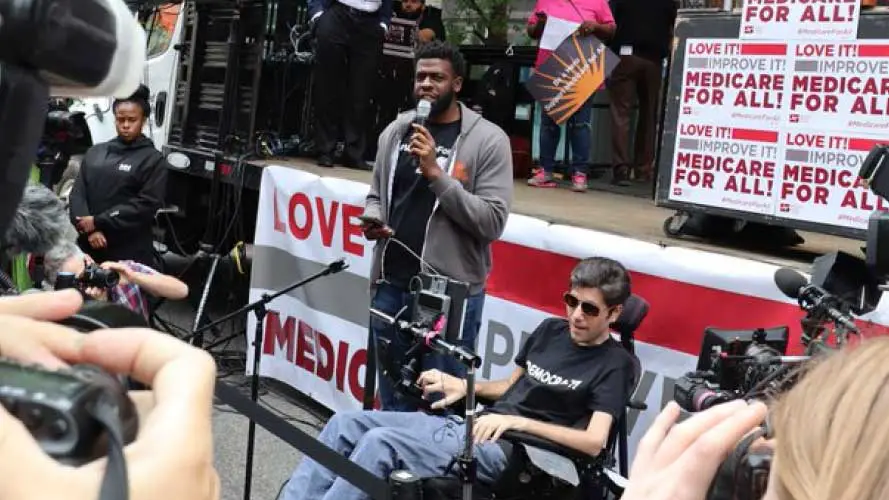
Editor’s Note: Ahead of a Tuesday hearing in the U.S. House Committee on Rules regarding Rep. Pramila Jayapal’s bill to establish a single-payer Medicare for All health care system in the United States, dying healthcare activist Ady Barkan released the following prepared remarks. Owing to the advanced progression of his ALS, Barkan will deliver this testimony using a computer system that tracks his eye movements and subsequently converts text into speech.
Chairman McGovern and members of the committee, thank you for inviting me to testify today. My name is Ady Barkan. I am thirty-five years old and I live in Santa Barbara, California with my brilliant wife Rachael and our beautiful toddler Carl. She is an English professor at the University of California Santa Barbara and I am an organizer at the Center for Popular Democracy and the Be A Hero project.
I earned my bachelor’s degree from Columbia University with a major in economics and my law degree from Yale Law School. For twenty years, since I was a freshman on my high school debate team, I have been giving speeches and presentations on topics like health care reform and the Federal budget.
But never before have I given a speech without my natural voice. Never before have I had to rely on a synthetic voice to lay out my arguments, convey my most passionately held beliefs, tell the details of my personal story.
Three years ago, Rachael and I felt like we had reached the mountaintop. We had fulfilling careers, a wonderful community of friends and family, and a smiling, chubby infant boy. We could see decades of happiness stretching out before us. The sun was shining and there was not a cloud in sight. And then, out of the clear blue sky, we were struck by lighting.
ALS. A mysterious neurological disease with no cure and no good treatment. A life expectancy of three to four years. Most of its victims are in their fifties and sixties. I was thirty two.
Every month since my diagnosis, my motor neurons have died out, my muscles have disintegrated, and I have become increasingly paralyzed. I am speaking to you through this computer because my diaphragm and tongue are simply not up to the task.
Although my story is tragic, it is not unique. Indeed, in many ways, it is not so rare. Jennifer Epps Addison, the president of my organization, is sitting next to me. Like me, her husband was struck at a young age by a neurological disease. Multiple sclerosis. Ten percent of Americans have a serious disability. Every family is eventually confronted with serious illness or accidents. On the day we are born and on the day we die, and on so many days in between, all of us need medical care.
And yet in this country, the wealthiest in the history of human civilization, we do not have an effective or fair or rational system for delivering that care. I will not belabor the point, because you and your constituents are well aware of the problems: high costs, bad outcomes, mind-boggling bureaucracy, racial disparities, bankruptcies, geographic inequities, and obscene profiteering.
The ugly truth is this: health care is not treated as a human right in the United States of America. This fact is outrageous. And it is far past time that we change it. Say it loud for the people in the back: health care is a human right.
For my family, although we have comparatively good private health insurance, ALS now means paying out of pocket for almost 24-hour home care. This costs us nine thousand dollars, every month. The alternative is for me to go on Medicare and move into a nursing home, away from my wife and my son. So we are cobbling together the money, from friends and family and supporters all over the country. But this is an absurd way to run a healthcare system. GoFundMe is a terrible substitute for smart Congressional action.
Like so many others, Rachael and I have had to fight with our insurer, which has issued outrageous denials instead of covering the benefits we’ve paid for. We have so little time left together, and yet our system forces us to waste it dealing with bills and bureaucracy.
That is why I am here today, urging you to build a more rational, fair, efficient, and effective system. I am here today to urge you to enact Medicare For All.
There are three simple reasons why Medicare For All is the right solution, the only solution, to what ails the American healthcare system. I will summarize them here, but I urge you to read the fantastic testimony submitted by the National Nurses United for more details.
First, Medicare For All will deliver to everyone living in America the high quality care that we deserve. The law will provide comprehensive care, including primary and hospital care, dental, vision, reproductive, and mental health care. We will all be allowed to see the doctors and specialists we want. And, crucially, the program will provide for long-term services and supports that will allow people like me to stay in our homes and communities, with the people we love. This will dramatically improve life for the tens of millions of people whose families include older or disabled people.
Second, Medicare For All will save the American people enormous sums of money. Under the program, there will be no premiums, no deductibles, and no copays. That means that we will no longer need to choose between paying the rent and filling a prescription. It means we will no longer delay necessary care until it is tragically late and tragically expensive. It means that we won’t have to worry every year when our employer announces the new rates. It means that we can finally start to eliminate the atrocious racial and economic disparities that destroy so many lives, that rob our communities of so much dignity, that strip us all of our common humanity.
Any proposal that maintains financial barriers to care — any proposal that continues to charge patients exorbitant copays, deductibles, and premiums — will necessarily leave people out. Any proposal that maintains the for-profit health insurance system will require that some people don’t get the healthcare they need. Without the generous support of my family and friends, this would include me.
Crucially, Medicare For All is the only way to make our healthcare system more efficient. Over the past three years, I have seen first hand how the current system creates absurdly wasteful cost-shifting, delays, billing disputes, rationing, and worry. Administrative waste is costing us hundreds of billions of dollars every year. Medicare For All will streamline the entire system, letting doctors and nurses focus on delivering care instead of on paperwork. As a single payer program, Medicare For All will be able to eliminate immoral price gouging by pharmaceutical and device companies. The fundamental truth is that too many corporations make too much money off of our illnesses, and they are spending gazillions of dollars lobbying and campaigning and fighting to stop us from building something better.
It is very important to emphasize the following point: these cost savings are only possible through a genuine Medicare For All system. Other proposals to increase health insurance coverage, such as those that would make Medicare compete with private insurance, would not facilitate administrative and billing savings.
There are many other major benefits to Medicare For All, and these are detailed in the written testimony submitted by the nurses and others.
But my time to deliver this testimony is running out. And, in a much more profound sense, my time to deliver this message to the American people is running out as well. So I want to end on this third and final note.
Our time on this earth is the most precious resource we have. A Medicare For All system will save all of us tremendous time. For doctors and nurses and providers, it will mean more time giving high quality care. And for patients and our families, it will mean less time dealing with a broken health care system and more time doing the things we love, together.
Some people argue that although Medicare for All is a great idea, we need to move slowly to get there. But I needed Medicare for All yesterday. Millions of people need it today. The time to pass this law is now. .
Winning this reform will not be easy. The monied interests will do everything in their power to stop us. And yet despite these obstacles and despite the personal challenges that I face, I sit before you today a hopeful man, a hopeful husband, and a hopeful father.
I am hopeful because right now, there is a mass movement of people from all over this country, rising up. Nurses, doctors, patients, caregivers, family members — we are all insisting that there is a better way to structure our society, a better way to care for one another, a better way to use our precious time together.
And so my closing message is not for the members of this committee. It is for the American people.
Join us in this struggle. Be a hero for your family, your communities, your country. Come give your passion and your energy and your precious time to this movement. It is a battle worth waging, and a battle worth winning. For my son Carl, for your children, and for our children’s children.
We have a once in a generation opportunity to win what we really deserve. No more half measures. No more healthcare for some. We can win Medicare for All.
This is our Congress. This is our democracy. And this is our future for the making.
Ady Barkan, dying of ALS, is a healthcare activist and Medicare for All proponent from California and co-founder of Be a Hero, which led the charge against Republican efforts to repeal the Affordable Care Act. Follow him on Twitter: @AdyBarkan
Op-eds are guest editorials from leaders in the community and beyond. South Bend Voice does not necessarily endorse the views expressed. It is our goal to spark critical thinking and vigorous debate.
This work is licensed under a Creative Commons Attribution-Share Alike 3.0 License.










